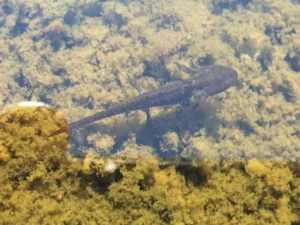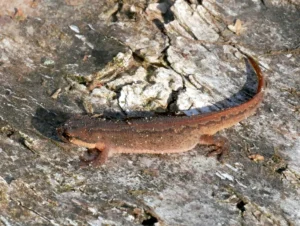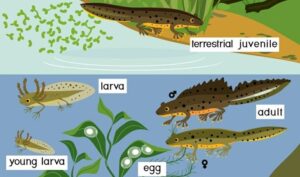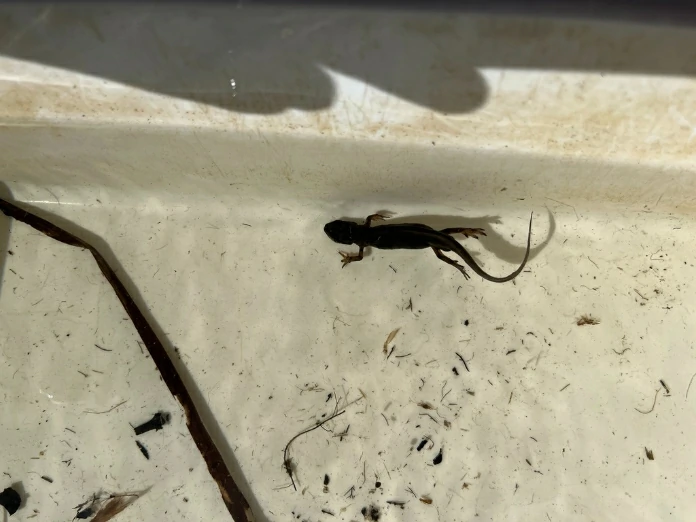On a quiet night by a pond, you might see a small creature gliding through the water. Its tail moves in gentle waves, and its skin shines under the moonlight. You might wonder: are newts aquatic?
Newts are partly aquatic, but not completely. They spend part of their lives in water and part on land. Their life changes with the seasons, and they move between both worlds to survive.
This dual life makes newts special. They are neither fully land animals nor fully water animals. Instead, they balance between two homes.
What Does Aquatic Mean For A Newt?
Aquatic means living mostly in water. Fish do this all the time. For newts, it is true only at certain stages.
Newts start life as eggs laid in water. When they hatch, they are larvae with gills, living fully underwater.

Gills are parts of the body that let them breathe in water. As they grow, they change. They grow legs, lose their gills, and move onto land.
So, newts are aquatic at first but later become semi-aquatic. They return to ponds for breeding, but spend much of their time on land.
How Do Newts Live In Water?
In water, newts are graceful. They swim with wiggling tails and use their small limbs for balance.
Water is where they mate and lay eggs. It is also where young newts, called larvae, grow and feed. The pond or stream provides shelter, food, and safety.
Still, newts need clean, unpolluted water. Their skin is delicate and can absorb toxins. If the water is dirty, it can mess up their life and they cannot survive.
How Do Newts Live On Land?
On land, newts walk slowly and carefully. They hide under leaves, logs, or stones to stay moist.

They hunt for insects, worms, and slugs. They avoid predators by keeping to damp, dark places. Land is where they rest and feed before returning to water to breed.
Their life on land shows they are not fully aquatic. They need both water and land to live.
Why Do Newts Move Between Water And Land?
Moving between land and water is part of their survival. Water is for reproduction. Land is for feeding and resting.
Seasonal changes guide their movements. In spring, they return to ponds to breed.
In summer, they spread out into forests, fields, or gardens. In winter, many hibernate under soil or leaf litter.
This pattern makes them semi-aquatic. They need both worlds to complete their life cycle.
Are All Newts Semi-Aquatic?
Most newts are semi-aquatic, but not all live the same way.
Some species spend more time in water. Others spend longer on land. The balance depends on climate, location, and breeding habits.
For example, the Smooth Newt spends much of the year on land but always returns to water in spring.

The Great Crested Newt also follows this pattern, staying hidden on land outside of breeding season.
How Do Newts Breathe In Water?
Newt larvae breathe with gills, just like fish. These gills draw oxygen directly from the water.
As they grow, they develop lungs and lose their gills. Adults can breathe with lungs and also through their skin. Their skin must stay moist to allow oxygen to pass through.
This means adult newts can survive in water, but they are not fully aquatic like fish. They need air and land to live.
What Role Does Water Play In Their Life Cycle?
Water is very important for breeding. Males use the water to show bright colors and court females.

Females lay eggs one by one on plants in the water. Each egg hatches into a larva that grows and changes until it can live on land.
Without ponds or streams, newts cannot reproduce. Even if they survive on land, their population will shrink without water.
Do Newts Hibernate In Water?
Some newts hibernate on land, under soil, logs, or stones. Others hibernate in water, hidden at the bottom of ponds.
The choice depends on the species and the environment. Water that does not freeze solid can be a safe place for winter rest. Land offers safety in warmer regions.
Either way, hibernation is important to survive the cold months when food is scarce.
Are Newts Good Swimmers?
Yes, newts are strong swimmers. Their tails are built for moving in water. They swim with side-to-side motions, similar to fish.
Swimming is important for hunting aquatic prey and escaping predators. During breeding season, males often swim actively to attract females.
Even though they are not always aquatic, their swimming ability is a key part of their survival.
How Do Newts Compare To Frogs?
Frogs and newts are both amphibians, but they live differently. Frogs are more tied to water. Many spend most of their lives in or near ponds.
Newts split their time more evenly between land and water. They have longer bodies and tails that help in swimming. Frogs jump, while newts walk slowly.
Both depend on water for breeding, but newts are more semi-aquatic than frogs.
Can Newts Live Entirely On Land?
Newts cannot live entirely on land. They dry out easily because of their skin.

They also cannot reproduce without water. Eggs need to develop in ponds or streams. Without water, the life cycle stops.
So, even though they spend much of their time on land, they must return to water at some point.
Are Newts Sensitive To Water Pollution?
Yes, very sensitive. Their skin absorbs oxygen but also absorbs chemicals.
Polluted water can kill eggs, larvae, and adults. Fertilizers, pesticides, and waste from farms are especially dangerous. Even small amounts can harm them.
This sensitivity makes newts important indicators of healthy environments. Where newts thrive, the water is usually clean.
How Do Newts Survive Drought?
Droughts are dangerous for newts. Ponds may dry before larvae finish growing. Adults may struggle to find moist hiding spots.
Newts sometimes bury themselves deeper in soil or hide under logs to avoid dry air. Still, long droughts can wipe out local populations.
This is one reason hotter summers with less rain are a big threat. Climate changes put pressure on newts everywhere.
Are Newts Found In Rivers And Lakes?
Most newts prefer smaller bodies of water like ponds, streams, or ditches.
Large rivers or lakes often have too many fish, which eat eggs and larvae. Calm, shallow water is safer for breeding.
Still, newts may use quiet areas along lake edges or slow-moving streams if the conditions are right.
Do Newts Stay In Water Year-Round?
No, most newts only stay in water during breeding season.
After breeding, they leave and spend much of the year on land. Only a few may stay in ponds year-round if conditions are safe.
Their semi-aquatic nature means they are never tied to just one environment for too long.
Can You Keep Newts In Aquariums?
Yes, but it is difficult. They need both water and land in a tank.
The water must be clean and filtered. The land must be moist and full of hiding spots. Food like worms and insects must be provided.
Captive care must match their semi-aquatic nature. Without both environments, they cannot stay healthy.
Conclusion
Are newts aquatic? The answer is partly yes and partly no.
Newts start life fully aquatic as larvae. As adults, they live on land but return to water to breed. They are semi-aquatic creatures, needing both habitats to survive.
Their delicate skin, unique life cycle, and seasonal movements make them special. Protecting both ponds and forests makes sure they continue to thrive.
Hi, my name is Ezra Mushala, i have been interested animals all my life. I am the main author and editor here at snakeinformer.com.

